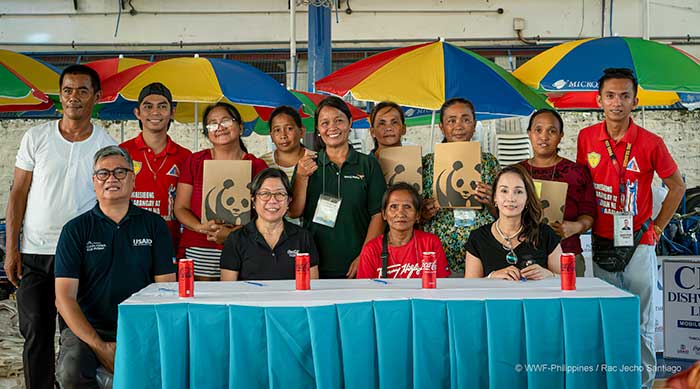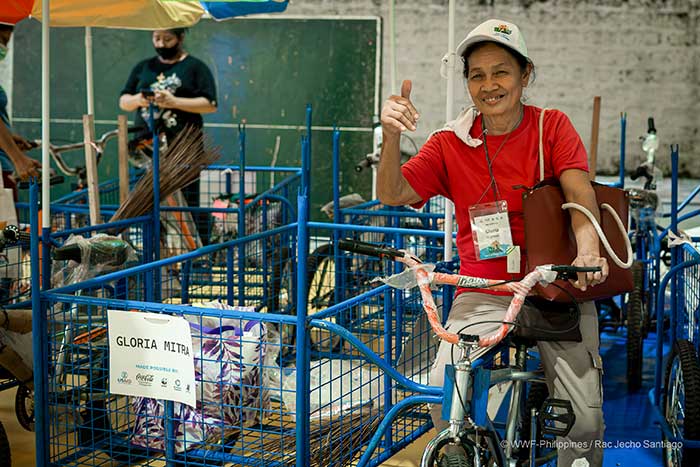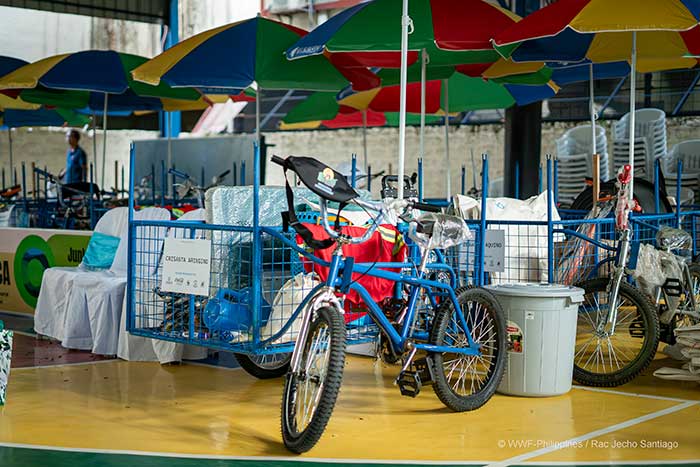
Twenty female waste workers from the Cities of Caloocan, Malabon, Manila, Pasig, Quezon and San Juan received financial assistance and new equipment in September, International Coastal Clean-Up Month, which they will use to jumpstart their own waste management businesses.
“Nagpapasalamat ako sa lahat nang nakatulong sa amin, na nagturo sa amin kung paano matutunan ang pagsesegregate ng basura at lalong lalo na [paano] makatulong kami sa kalikasan para mabawasan ‘yung mga basura maaaring makarating sa karagatan,” says Gloria Mitra, a grantee and door-to-door waste collector from Malabon City.
[Translation: I am grateful to everyone who helped us and taught us how to segregate waste and care for the environment so we can reduce the waste flowing into the ocean.]
The waste workers — who are a mix of collectors, aggregators, street sweepers and junk shop owners — received their new equipment on Wednesday, September 6, at the Cristy Hernandez Activity Center in UP Diliman, Quezon City. They received push carts, first aid kits, banners and clothes, among others.

The equipment and grants are part of the Women in Waste Economic Empowerment program of the Clean Cities, Blue Ocean (CCBO) initiative under the United States Agency for International Development (USAID).
This is in partnership with WWF-Philippines and the Coca-Cola Foundation Philippines, Inc. (CCFPI) as well as the Associated Resources for Management and Development, Inc. (ARMDEV) and the EcoWaste Coalition’s Basic Business Empowerment Skills Training (BBEST) that is also funded by CCBO.
“Kami ay nagagalak makita na ang munting tulong na naibigay namin sa mga kababaihan ay kaya nilang palaguin para sa kanilang pamilya. Ituloy natin ang sama-samang pagkilos para sa kabutihan ng ating pamayanan at kalikasan,” says Ma. Cecilia Alcantara, CCFPI President.
[Translation: We are glad that the women were able to grow the support we provided them for their families. Let us continue to work together towards the good of the environment]
Before the equipment turnover, the grantees underwent a series of capacity-building sessions under BBEST, where they learned the importance of waste management and how to manage a waste management business. They were chosen for the grants based on the business ideas they presented.
Among the grantees was Nanette Ruiz, a junk shop owner from Manila who shared that after attending the training, she was invited to conduct seminars and share best practices on waste collecting to teach other waste workers.
“Naging speaker ako sa kalakal, so ang lahat nang natutunan ko nashare ko sa kanila,” says Nanette.
[Translation: I became a speaker for waste collecting, and everything I learned I was able to share to others]

As a gesture of gratitude for the partners of the WWEE Program, she even named her business “BW & Nethz Junkshop” — BW stands for BBEST and WWF, she shared.
The training also emphasized the importance of looking after one’s health and well-being which was an eye-opening experience for some of the women.
“Ang pinakamahalagang natutunan ko ay ‘yung alagaan ‘yung sarili ko bilang babae. Kasi tayong mga bilang babae, nakakalimutan natin kasi inuuna natin ‘yung ibang tao pero sarili natin hindi na natin naasikaso… Kung wala po tayo, kawawa po ‘yung mga kasama natin,” says Maricel Castro, from Caloocan.
[Translation: The most important lesson I learned was to take care of myself as a woman. Because as women, we tend to put other people first and forget to care for ourselves… If we are not around, our loved ones will suffer.]
After the training, Castro and three other women formed a group for their door-to-door waste collecting business. They named it “D4 Strong Women.”
The WWEE project is part of WWF-Philippines’ No Plastics in Nature (NPIN) initiative which aims to stop the flow of plastics into the environment by 2030. This initiative includes lobbying for waste management policies to have gender-inclusive provisions and that would integrate the informal waste sector into the waste management system.
“Ang paglaban sa plastic pollution ay hindi kumpleto ng wala ang mga kapartner nating waste workers. Sila ay importanteng parte ng ating solid waste management system na kailangang hindi kalimutan bagkus ay suportahan. Importante na maisama natin sila sa mga Extended Producer Responsibility (EPR) programs na isinasagawa ngayon halimbawa,” says Czarina Constantino-Panopio, NPIN Program Manager.
[Translation: Our fight against plastic pollution will not be enough without our partner waste workers. They are an important part of our solid waste management system and they should be supported, not disregarded.]
These policies include the Extended Producer Responsibility law which requires big businesses to recover a percentage of their plastic waste at certain years. The WWEE Consortium hopes that the law will be able to ensure support for the informal waste sector in the form of continuing what the WWEE project has done, such as providing them with equipment and training, and integrating them into the solid waste management system.





















